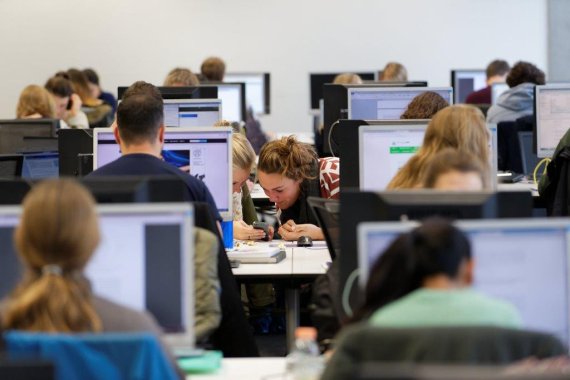©Guy Ackermans
The working group, led by director of the Social Sciences Group Jack van der Vorst and director of Education Arnold Bregt, is holding meetings on campus this month. Judging by the number of student applications and the evaluations it gets, Wageningen University is doing very well, says Van der Vorst, but further growth in student numbers will force the university to make choices. The working group has sketched three scenarios for the future, as a starting point for discussion.
Impact
In the first scenario, the university prioritizes social impact. It offers broad Bachelor’s programmes and interdisciplinary Master’s degrees for about 20,000 students, tackles complex societal problems in interdisciplinary research teams, and collaborates with industry and NGOs to help achieve the sustainable development goals. In view of this focus on solutions, the university merges with Wageningen Research. In the second scenario, Wageningen becomes an excellent research university. It stops offering Bachelor’s degrees, selects the best 5000 Master’s students and aims at innovative fundamental research and a position at the top of the international rankings. This exclusive Harvard-style university is funded by the government and by rich alumni, and is clearly distinguishable from Wageningen’s applied research institutes.
Domain
In the third scenario, Wageningen restricts its domain to agriculture and food, coordinating this with the other Dutch universities. Through this focus, the university can go for both social impact and academic excellence. It has a unique position with its roughly 15,000 Bachelor’s and Master’s students, and it merges with Wageningen Research.
The aim is not to make a choice between these scenarios, explains Van der Vorst. They simply provide a basis for discussion, and for finding out which elements we want and which we don’t.
Bachelors
Education director Arnold Bregt has now attended a few discussions with professors and students. It was obvious to him that students do not want the university to do away with the Bachelor’s degrees, as described in the second scenario. ‘They also think it would be too extreme to cut back to 5000 students, because the university would then lack the capacity to solve complex problems.’ Several of the professors, on the other hand, were attracted to the idea of focussing on excellence without Bachelor’s degrees, says van der Vorst. ‘Opinion is very divided on this point.’

